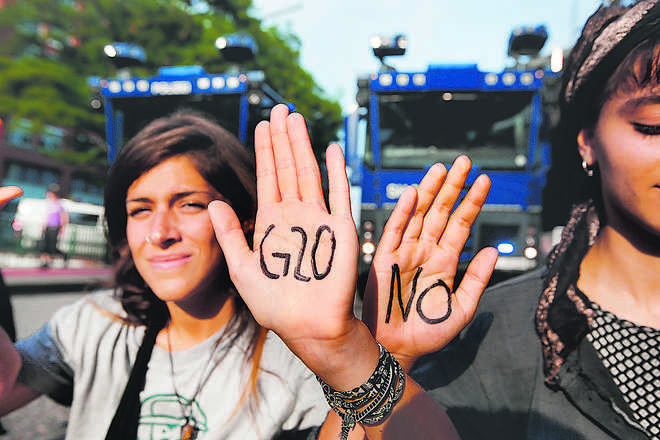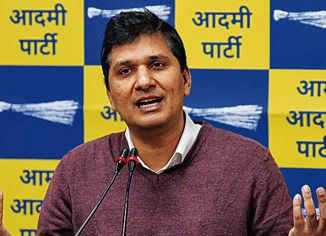
NO WAY: The G20 summit at Hamburg saw street protests against globalisation.
KC Singh
INTERNATIONAL relations since US President Donald Trump’s assumption of office, in the words of Lewis Carroll’s Alice in Wonderland, have got ‘curiouser and curiouser’. The G20 summit at Hamburg saw huge street protests against globalisation as Trump cut a lonely furrow, isolated from the mainstream of the pro-climate, pro-globalisation majority of principal global economies. Among the protesters was the mayor of New York. Someone on Twitter quipped that had Arvind Kejriwal, Chief Minister of Delhi, joined him, a number of television anchors, who are self-appointed purveyors of nationalism, would have lost their minds.
The division between nations globally today, according to The Economist, is no longer merely between the developing and the developed world; it is between globalists and nationalists. Actually, countries like India and China may be a bit of both, led by nationalist leaders rooting for free trade while protesting the developed world’s restrictions on free movement of workers and non-tariff barriers. India and China are now pro-Paris climate accord, having in the past insisted that historical polluters amongst developed nations held primary responsibility to mitigate climate change. This role reversal is peculiar as the US, the biggest global economy, rejects it even as a huge chunk of Antarctica is about to detach and float free.
Against this churning, where old alliances are tested and new partnerships transactional, and as yet fragile, a pandemic of corruption cases or tax enquiries in multiple nations has broken out, putting even formerly revered political leaders in the dock and upturning democratic polity. On July 10, a Pakistani joint investigation team, which included two members from the army, submitted a damning report, based on Panama Papers’ revelations, linking the progeny of PM Nawaz Sharif to illicit wealth abroad. The Pakistan Supreme Court is to determine culpability.
Two days later, a Brazilian judge pronounced former President LI Lula de Silva guilty of corruption in awarding contracts after a three-and-a-half-year-old operation, Lava Jato, which is now turning its attention to the serving President Michel Tener. Lula was the co-founder of BRICS and a charismatic international figure who campaigned alongside India, Germany and Japan, through the G4 grouping, for the reform and expansion of the UN Security Council.
Separately, as the retired shaper of contemporary Malaysia, Dr Mahathir Mohamad (92) began rallying opposition against his own former ruling party, the government opened investigation into big losses in the early 1990s, when Mahathir was PM, in Central Bank’s foreign exchange trades. In Israel, PM Benjamin Netanyahu came under renewed scrutiny over bribery charges in the German submarine deal, in which his nominee to head the National Security Council and his personal attorney is impugned.
In India, crucial opposition figures are being similarly pilloried. Lalu Yadav, the presiding deity of the RJD, and crucial to restricting the BJP in Bihar in the 2019 Lok Sabha elections, finds the tax authorities rummaging through every contract awarded decades ago when he was Minister for Railways.
The favoured treatment to former Jayalalithaa associate and current claimant to the AIADMK leadership, Sasikala, ignores the question: when have politicians in India, even in jail, been treated as common criminals? The fight, in fact, is over the control of the orphaned party. Would the BJP obtain control through pliant surrogates, considering AIADMK’s huge numbers in both Houses of Parliament, or the Congress by earning Sasikala’s goodwill?
Meanwhile, the Bofors case is being reopened, unceremoniously closed when the union government under the Congress did not appeal a negative verdict by the Delhi High Court. The selective use of the tax authorities to hound political rivals is not merely a third world malaise. At least, six US Presidents since Franklin D Roosevelt allegedly used the Internal Revenue Service and the Justice Department to pursue real and imagined enemies. David Burnham in A Law Unto Itself: Power, Politics and IRS writes: ‘It appears that President FD Roosevelt may have been the champion abuser’. In 1934, an indictment of billionaire Andrew Mellon for tax fraud fell through, but apparently FDR made peace with him in exchange for Mellon donating his vast art collection to the national museum. It is doubtful if the Modi government would settle for less than political emasculation of their principal opponents and their politically active family members.
In the meanwhile, Indian diplomacy confronts a vastly changing geo-political environment. Much diplomatic work over Modi’s first three years needs reassessment. Post-Brexit Europe is trying to cope with Trump-Putin cosiness and Trump’s endorsement of an initiative by Poland and Croatia to align the “3 Seas” nations, stretching from the Baltic in the north to the Adriatic and Black Seas in the south. These former Soviet satellites, or breakaway parts of the USSR that are, or can be, EU members, create a ribbon between Germany and Russia. The idea appeals to Russia as it gives it a strategic barrier with NATO, which is at the core of Russian objection to Ukraine tilting westwards.
Interestingly, the Chinese have merrily tied their OBOR initiative to this emerging bloc calling it the “16+1” initiative. This provides India space to work with Germany and France to counter this Chinese egress into the heart of Europe. Trump has promised US LNG to Poland via a new terminal on the Baltic while encouraging Croatia to open a facility on the Adriatic for the same. This pits the US against Russia which has for long used its gas supply to this region to manipulate them politically and via them build EU dependence on Russian gas.
The lesson for South Block was best imparted by the Queen of Hearts in Alice in Wonderland advising: ‘Now, here, you see, it takes all the running you can do, to keep in the same place.’ To get somewhere, the Queen surmised, ‘you must run at least twice as fast’. Contrariwise, the Minister for External Affairs and her two worthy deputies continue promising incredulous relatives that their missing kin, last seen in Mosul long ago, have been carted away by a retreating and rapidly decimating ISIS to another jail. To end, as this piece began, it is indeed ‘curiouser and curiouser’.
The writer is a former Secretary, Ministry of External Affairs






















